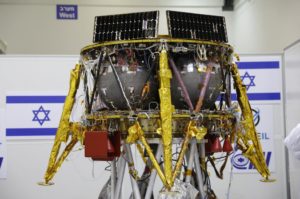By Machla Abramovitz
Israel’s first lunar spacecraft “Beresheet”
For a small nation with big dreams, Israel almost made history as the fifth nation to successfully land a spacecraft on the moon had it not crashed on April 11th in the final moments of its journey. Penetrating the moon’s surface was in and of itself a breathtaking accomplishment, and one that wasn’t achieved out of the blue. The scientific and technological skills needed to accomplish this feat is generated and developed from an early age, where gifted and talented elementary and high school students are given every opportunity to excel academically and creatively.
Over the past decade, Israeli students distinguished themselves internationally in all kinds of forums. Just last week, at the Asian Physics Olympiad that took place in Australia, three Israeli high school students won gold, silver and bronze medals, including an honorable mention.
Aviv Tillinger (gold, and 4th absolute place), Eyal Walach (silver), Eran Man (bronze), and Omri Ravad (honorable mention) beat out 200 of the brightest physics students from 27 countries. Tillinger received the highest award given to an Israeli student in this field.
Achieving this kind of success was no easy task. Competitors were required to take two five-hour long exams of university standard – one on theory, and the other practice. They were tested on complex subjects such as X-ray jets from black holes and quantum computer components. As well, their critical thinking and problem-solving skills were displayed during a variety of exam tasks specifically developed to inspire and challenge these physics proteges.
In chemistry, as well, Israel excelled. A month earlier, Roi Pe’er, one of five high schoolers comprising the Israeli team, won bronze at the 53rd International Mendeleev Chemistry Olympiad in St. Petersburg, Russia. Again, the requirements for success were extremely steep. Unlike previous competitors who were asked to identify unknown substances, these young scientists were required to synthesize an organic compound, which represents a much higher level of complexity. Competitors underwent three rounds of tests: two theoretical, and one experimental. Winners earned the highest scores in all three rounds. More than 150 students from 29 countries participated, including Russia, Belarus, Kazakhstan, Israel and the Baltic states.
“Roi is a model of effort, determination and excellence,” said the Ministry of Education and the Center for Future Scientists who train the Israeli teams.
These high achievers followed in the footsteps of other Israeli achievers. In July 2018, students competing in the International Physics Olympiad held in Lisbon, Portugal won two gold medals and three silvers, while those competing in chemistry in the Czech Republic and Slovakia brought home silver and bronze.
“These youth are Israel’s technological future,” former Minister of Education Naftali Bennett proudly tweeted.
Its not only in the sciences that Israeli students excel. In Aug 2018, Meir Cohen, an MBA candidate at Bar-Ilan University’s Graduate School of Business Administration, became the first Israeli to win first place in the global Capsim Challenge of business simulation in which competitors were challenged to run a multi-million-dollar simulated company. Competing against 200 teams, Bar-Ilan’s team showed record results: In the final rounds, Cohen competed with students from New York, Utah, Illinois, India and Thailand.
Its no wonder that Israeli students excel academically given that a large percentage of Israel’s Gross Domestic Product (GDP) is spent on education. According to a 2015 report by the Organization for Economic Co-operation and Development (OECD), Israelis attained some of the highest levels of education of all 34 countries that comprise the OECD, in every age group.
“The education report of the OECD is the world’s bible for education among developed countries. For Israel, it is also a report about our future security because only a leading and excellent education system will let us deal with the multiple and intensifying challenges and threats,” says Carmel Shama-Hacohen, Israel’s envoy to the OECD.


